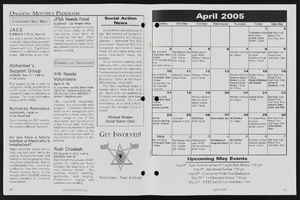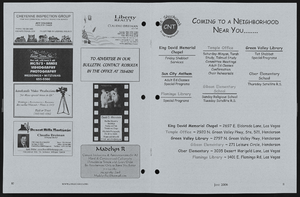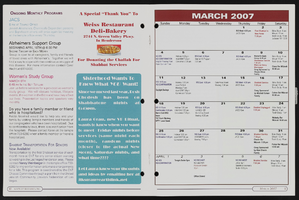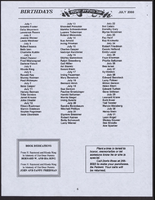Search the Special Collections and Archives Portal
Search Results

Sook-ja Kim, February 12, 1996 and April 6, 1996: transcript
Date
Archival Collection
Description
The Kim Sisters, composed of three sisters, Sook-ja, Ai-ja, and Mia, came from Korea to Las Vegas in February 1959. Their first contract in America was to perform at the Thunderbird Hotel for four weeks as part of the China Doll Revue, the main showroom program. This engagement led to a successful career. Their popularity reached was at its height at the end of the 1960s when they performed throughout the United States and Europe. Sook-ja Kim is the oldest of the sisters. After his sister Ai-ja died in 1987, Sook-ja teamed up with her two brothers and continued to perform until 1989. Now semi-retired from show business, with occasional performances in Korea, she is working as a real estate agent. In this interview, she talked about her childhood, her career, and the family she has built since coming to America. Sook-ja was born in 1941 in Seoul, Korea as the third child of seven in a musical family. Her father was a conductor and her mother, a popular singer. After the Korean War, her mother arranged to send the Kim Sisters to America. When they came to Las Vegas, there were virtually no Koreans in the area. They depended on each other to take care of themselves. Some of the difficulties they had to adjust to in American were language, food, and cultural differences. Over the span of almost forty years in America, Sook-ja became acculturated without discarding her ethnic identity of family priorities. Her life-long guiding principle has been to adopt certain American values while continuing to keep her cherished Korean ethnic values. Through their performances, the Kim Sister informed the audience about Koreans and their culture. As the oldest of the group, Sook-ja was entrusted the care of her sisters, and later her brothers, the Kim brothers. Once she settled in Las Vegas, she brought more than forty members of her extended family to the city, contributing to the growth of the Las Vegas Korean community.
Text

Mach and Arlene Manuel oral history interview: transcript
Date
Archival Collection
Description
Oral history interview with Mach and Arlene Manuel conducted by Kristel Peralta and Stefani Evans on June 28, 2021 for Reflections: The Las Vegas Asian American and Pacific Islander Oral History Project. Mach and Arlene Manuel share the story of their overseas courtship and how they came to be together in the United States. Arlene was raised in the Philippines while Mach was born and raised in San Diego, California. Mach describes his visit to the Philippines as an adult when he began to connect more to his Filipino heritage. The couple shares how they dated for 13 years before Arlene moved to San Diego, and how the Manuel family came to live in Las Vegas in 2017 to pursue Arlene's nursing career. Arlene and Mach talk about cultural differences and discrimination, emigration and diversity, religion and identity, and Filipino food, among other topics. Subjects discussed include: Manila, Philippines; discrimination of class; and anti-Asian hate.
Text
Ida Brewington Pittman Photographs
Identifier
Abstract
The Ida Brewington Pittman Photographs contain photographs of Ida Brewington Pittman and her husband, Nevada Governor Vail Pittman, from 1896 to 1976. The photographs primarily depict Governor Pittman at political events, parades, celebrations, and events. The photographs include Governor Pittman meeting with politicians like President Harry S. Truman, U.S. Senator from Nevada Pat McCarran, Las Vegas, Nevada mayor Ernie Cragin, California Governor Earl Warren, Utah Governor J. Bracken Lee, Oregon Governor Earl Snell, and Wyoming Governor Lester C. Hunt. The photographs also depict the Pittman and Brewington families, the Governor’s Mansion in Carson City, Nevada, the Pittman home in Ely, Nevada, and the Pittmans travelling in other countries.
Archival Collection
Jean Ford Photograph Collection
Identifier
Abstract
The Jean Ford Photograph Collection (1964-1977) contains black-and-white photographic prints, contact sheets, and transparencies of Nevada politician and activist Jean Ford. The collection includes photographs of Jean Ford with the Nevada State Park Commission and various Nevadan politicians; Ford lecturing and campaigning; and of the 1977 National Women's Conference in Houston, Texas.
Archival Collection






